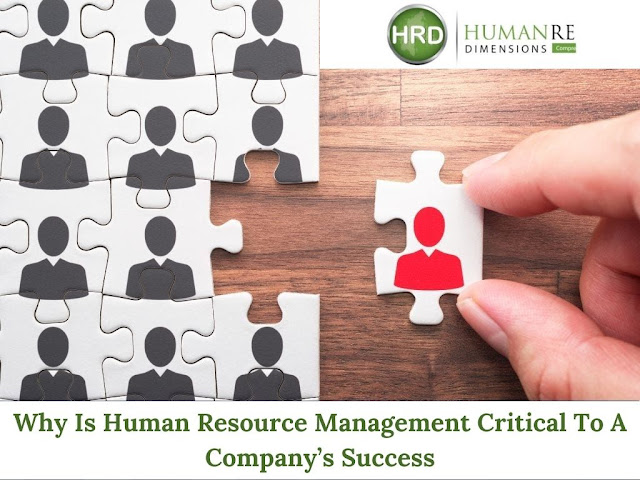Why Is Human Resource Management Critical To A Company’s Success
Today's business world is fast and always changing. Companies are always looking for ways to be better than their competitors. In all the different things companies do to succeed, one thing is super important – Human Resource Management (HRM). This is like the heart of a company, helping it grow and be successful. It's not just a department; it's a key partner that can really impact whether a company does well or not.
1. Talent Acquisition and Retention
At the heart of every successful business is a talented and motivated workforce. Human Resource Management is the gatekeeper of this invaluable asset. The process begins with talent acquisition, where HR professionals identify, recruit, and onboard individuals whose skills align with the company's objectives. Through strategic recruitment and selection processes, the Human Resource Company ensures that the organization is staffed with individuals who not only possess the necessary skills but also resonate with the company's culture and values.
However, attracting talent is only the beginning. Retaining top talent is equally crucial. HRM plays a pivotal role in developing and implementing retention strategies, fostering a positive work environment, and ensuring employee satisfaction. By addressing concerns and providing growth opportunities, the HR department helps create a workplace where employees feel valued, reducing turnover and fostering long-term commitment.
2. Employee Development and Training
In the dynamic business landscape, constant adaptation is key to survival. HRM takes the lead in employee development and training initiatives, ensuring that the workforce remains equipped with the skills needed to navigate evolving industry demands. Human Resource Companies play a crucial role in identifying skill gaps, designing training programs, and facilitating continuous learning opportunities for employees.
Investing in employee development not only enhances individual capabilities but also contributes to the overall competitiveness of the organization. A skilled and knowledgeable workforce is better positioned to drive innovation, increase productivity, and adapt to changing market dynamics.
3. Building a Positive Organizational Culture
Organizational culture is the DNA of a company, influencing how employees interact, collaborate, and approach their work. HRM plays a central role in shaping and nurturing a positive organizational culture. By fostering a workplace that values diversity, inclusivity, and employee well-being, HR professionals contribute to increased employee satisfaction and engagement.
A positive culture not only attracts top talent but also enhances employee morale and productivity. It becomes a driving force behind innovation, teamwork, and a collective commitment to the company's mission and goals.
4. Strategic Workforce Planning
Strategic workforce planning is an essential element of HRM that aligns human capital with the overall business strategy. Human Resource Companies analyze the current and future needs of the organization, identifying the skills and talents required to achieve strategic objectives. By anticipating future staffing needs, HR professionals can proactively address gaps and ensure that the company has the right people in the right roles at the right time.
Strategic workforce planning also involves succession planning, ensuring that there is a pipeline of talent ready to step into key positions as they become available. This proactive approach minimizes disruptions and ensures continuity in leadership and critical roles.
5. Employee Engagement and Performance Management
Employee engagement is more than just a buzzword – it's a critical factor in a company's success. HRM is responsible for implementing strategies to enhance employee engagement, from regular feedback mechanisms to recognition programs and opportunities for professional growth. Engaged employees are more likely to be committed to their work, resulting in higher levels of productivity and innovation.
Additionally, HRM oversees performance management processes, providing constructive feedback and setting clear expectations. By aligning individual goals with organizational objectives, HR professionals contribute to a high-performance culture that drives success.
Conclusion:
The Human Resource Dimensions firm in Atlanta is the best human resource firm. They provide a wide range of services, from recruiting and hiring to training and development. Their team of experts is always on hand to help their clients navigate the complexities of the HR world. Their reputation for excellence is unmatched. Human Resource Management is the backbone of a successful company. From talent acquisition and development to fostering a positive organizational culture and strategic workforce planning, HRM touches every aspect of an organization. For a Human Resource Company, recognizing the critical role of HRM in driving success is not just a strategic move but a necessity in today's competitive business environment. It's not merely a department; it's a strategic partner that can elevate a company to new heights.




Comments
Post a Comment